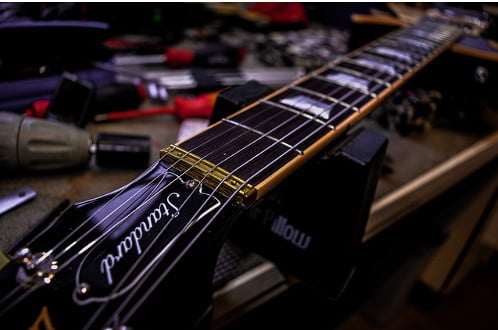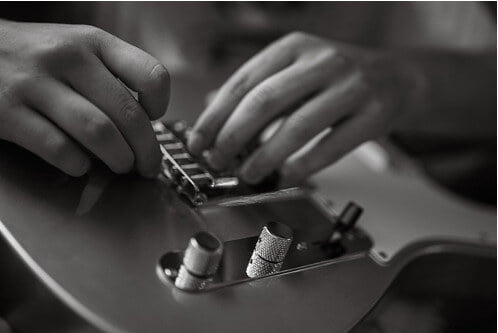Table of Contents
When searching for information about worn frets, it’s normally a new experience. Once your guitar becomes hard to play or strings begin to buzz, there is a good chance your frets are worn out.
Most players don’t realize that the frets wear out and eventually need to be changed. One would assume that the strings could never do that kind of damage to the frets.
But I’m afraid it’s true, they wear down and sometimes quite badly, even to the point of being sharp. Divots and dents begin to make the guitars unplayable at certain notes on the neck.
It’s at this point, playing only becomes a frustration and so now service is required. But how much does it cost to refret a guitar?
The Basics of Refretting
So, what’s the big deal about refretting? Simply put, refretting is the process of replacing the frets on your guitar‘s fretboard.
Frets are those metal strips that run across the neck of your guitar. Over time, they can wear down, get damaged, or just lose their luster, affecting the sound and playability of your instrument.
Now, you might wonder, “When should I even consider this?” Good question. Here are some signs that it might be time for a refret:
- Buzzing sounds when you play certain notes
- Difficulty in pressing down on the strings
- Uneven fret heights causing intonation issues
- Visible wear and tear, like divots or flat spots on the frets
Refretting isn’t just slapping on some new metal strips and calling it a day. Oh no, it’s more involved than that.
The old frets have to be carefully removed. Then, the fretboard may need leveling, and new frets must be precisely installed. After that, they’re polished and the guitar is set up to make sure everything’s in tip-top shape.
Refretting rejuvenates your guitar, making it sound and feel like a brand-new instrument. But hold your horses; this transformation comes with a price tag. And that’s what we’ll tackle next.
How Much Does It Cost to Refret a Guitar?
There are two ways to go about performing a refret on your guitar. Doing it yourself and taking it to a professional. Now, performing a refret is not an easy job. A majority of the cost to do the job with a professional will be labor fees.
If you plan to take it to a professional, you can get back to playing without the worry of messing up the fingerboard. Whereas doing it yourself the first time could result in irreparable damage.
The cost to replace frets on a guitar ranges from 300 to $500. In most cases, this will include the fret wire when done by an experienced professional. It’s well worth it when the guitar has a higher value.
Factors Affecting the Cost
- Type of Guitar: Acoustic, electric, or bass—each has its own set of challenges and, therefore, costs.
- Material of the Frets: Nickel frets are generally cheaper than stainless steel ones. The material you choose will impact the final bill.
- Labor Charges: The expertise of the person doing the job can significantly affect the cost. More experienced luthiers usually charge more, but the quality of work is often better.
- Geographical Location: Believe it or not, where you live can also affect the cost. Rates are generally higher in big cities compared to smaller towns.
- Additional Services: Sometimes, the fretboard needs leveling, or the nut may need replacing. These add-ons will bump up the price.
Additional Costs
Ah, the fine print. Just when you think you’ve got all your ducks in a row, additional costs can sneak up on you like a cat on the prowl. Let’s shed some light on these often-overlooked expenses that can make your final bill a bit heftier than expected.
Nut Replacement
Sometimes, a refret job requires a new nut to accommodate the new frets. This small piece of bone, metal, or synthetic material at the top of the fretboard can cost anywhere from $10 to $80, depending on the material and complexity.
Fretboard Leveling
Before new frets take their place, the fretboard might need some TLC. Leveling ensures that all the frets sit evenly, providing better playability. This can add another $50 to $100 to your bill.
Setup Charges
After the new frets are in, your guitar will need a setup to make sure everything’s working as it should. This involves adjusting the truss rod, setting the action, and intonation. Expect to shell out an extra $50 to $75 for this.
Rush Fees
In a hurry? Some shops offer expedited services, but at a premium. Rush fees can add 20% or more to the total cost.
Taxes and Labor
Last but not least, don’t forget about sales tax and labor costs, which can vary depending on where you live and who’s doing the work.
So, before you give the green light for that refret job, make sure you ask about these additional costs. It’s better to have a full picture upfront than to be caught off guard later.
| Materials | Cost In US Dollars |
| Maple board color match respray | 50 to 75 |
| New nut, material dependent | 15 to 60 |
| Inlay repair | 30 to 50 |
| Fretboard repair | 20 to 40 |

Why Is a Guitar Refret So Expensive?
There is a large cost to refret a guitar with a professional. This is because re-fretting a neck is a very large job. On average, it can take a luthier anywhere from 6 to 10 hours in labor to correctly perform a fret job. There are many frets and each one needs to be replaced.
The frets need to be changed, but the professional will also have to level them, re-crown and even set up the guitar. This doesn’t include the nut replacement and any other repair work that might be needed.
If you have ever attempted to perform a fret job on a guitar, you will know that it can be labor-intensive. There are many players who have done a few, but now gladly pay a technician the fees.
You may want to try to do a guitar fret job, just to see what is involved. This might help you understand why a tech charges what they do. Or you might even enjoy doing them and can save the fee of all the labor. Only one way to find out.
Is Refretting a Guitar Worth It?
The best place to start when trying to determine if it’s worth re-fretting a guitar is the market value. A model that isn’t worth very much should only be re-fretted if it has some kind of personal attachment.
Perhaps it was a gift from a family member that makes it priceless. In this case, it would be worth the fees, even if it wasn’t high in market value.
If the instrument is a rare vintage worth a few thousand dollars, then the cost to do the job is minor. In some cases, it will raise the value. Or at the very least get you top market value. Some people will pay more to know the guitar has new frets and was set up to play perfectly.
It can also be just as easy as buying a new neck and bolting it up if you’re able to do so. Especially if the guitar is not worth much.
Does it Hurt Resale Value?
A fret job can make the guitar worth less. There are many collectors that will not pay top market value for a vintage model that has had them replaced. To a collector who is not buying it to play, the old original frets are worth more.
To a player, new frets would be more desirable and thus a higher price might be acceptable.
So depending on the guitar, the value could be affected negatively. There are a lot of vintage instruments worth a pretty penny. They keep their value because of the original frets. If you have a model that is of high market value, do your due diligence before performing a fret replacement.

DIY vs. Professional Services
Most people see the price to have someone else refret and immediately wonder if it’s something they can do themselves. And yes, it’s possible to do yourself, but not everyone can do it well. Here are some pros and cons to both:
The DIY Route
Pros:
- Cost Savings: No labor charges mean you could save a pretty penny.
- Skill Building: You’ll learn the ins and outs of your guitar, which is a valuable skill for any musician.
- Personal Satisfaction: There’s a sense of accomplishment in doing it yourself.
Cons:
- Time-Consuming: It’s not a quick job; you’ll need to set aside a good chunk of time.
- Risk of Errors: One wrong move and you could damage your guitar, possibly leading to more expensive repairs.
- Tool Investment: You’ll need specific tools, and quality ones aren’t cheap.
Professional Services
Pros:
- Expertise: Professionals have the experience and know-how to get the job done right.
- Convenience: Drop off your guitar, pick it up when it’s ready—simple as that.
- Guaranteed Work: Most reputable shops offer some form of warranty or guarantee.
Cons:
- Cost: Labor charges can add up, making it more expensive than DIY.
- Wait Time: Depending on the shop’s workload, you might have to wait longer than you’d like.
- Less Personal Control: You’re entrusting your guitar to someone else, which can be nerve-wracking for some.
In the end, the choice between DIY and professional services boils down to what you value more: time or money? Skill or convenience? Either way, make sure you’re fully informed before making a decision.
How Many Times Can You Refret a Guitar?
Because removing a guitar fret can do damage to the neck, there is only a certain number of times the repair can be done. Each time, material from the neck will be removed. After three to four refret services, the neck might be in rough shape.
Some guitar technicians can repair it, but at some point, that favorite neck might need to be replaced. Luckily, frets do last a long time, so using a material that is harder may preserve your guitar neck.
Stevie Ray Vaughan had to retire a neck from his favorite Stratocaster called number one. After a while, the fret service damaged the neck to a point that it wasn’t repairable.
And so a new neck was required. Yet, he used the guitar more than most people and really put it through the wringer with heavy strings.
Summary
So, How Much Does It Cost To Refret A Guitar? Well, it’s more than we would like as players. But there really is nothing like an instrument that is easy and fun to play without dead notes. New frets will give us all that and more!
FAQ
How do I know if my guitar needs new frets?
One of the more obvious signs are divots. If you inspect your frets and see grooves or divots in them, it may be time to replace. You will also experience buzzing or dead notes as a result.
How often should you replace frets?
Frets only need to be replaced when they are worn out. There is no need to change them otherwise. They don’t have a shelf life and will never lose the ability to provide good tone by sitting.

